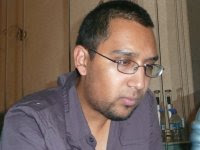
Yesterday I was introduced to Ahmad al-Katib and I am now somewhat embarrassed having to admit that until then I did not know who he is. But after our brief initial conversation, I have become intrigued by his views and I look forward to learning more from him about his thoughts on the Shi'a tradition.
Ahmed al-Katib (this is the nom de plume under which he publishes his writings) was born in Karbala, a town in southern Iraq which is home to the shrine of Imam al-Husayn, the martyred son of Imam Ali ibn Abu Talib and a grandson of the Prophet Muhammad. He received a traditional Shi'ite Islamic education at the renowned Hawza or 'seminary' of Najaf -- Karbala's 'sister city' and burial place of Imam Ali, but because of his dissenting opinions regarding key aspects of Shi'ite doctrine, he was never given an ijaza -- the equivalent of an academic degree.
During the 1980s, al-Katib lived in Iran, where he not only founded and directed an Arabic-language radio station opposing and challenging Saddam Hussein's regime during the dragged-out Iraq-Iran war (1980-1988), but also continued his studies into the Shi'a Islamic heritage. Based on his research in Tehran and at the Hawza's in Qom and Mashhad, he articulated a very critical rereading of received knowledge in the Shi'a tradition, questioning the core of its doctrinal positions.
Al-Katib's critique hinges on his skepticism regarding the veracity of the notion of the so-called 'Hidden Imam'. The accepted view among Shi'a Muslims is that the last of the twelve Imams recognised by the Imami or Ithna'ashariya Shi'ites, who is assumed to have been born in 869/9CE, did not die but went into 'Occultation' or Ghayba. However, on the basis of his own examination of available sources on the history of the Imams, al-Katib comes to the very radical conclusion that there is no hard evidence of the birth of this alleged Last Imam, Muhammad ibn al-Hasan, also known as the Al-Mahdi; the messianic figure said to return at the End of Times.
According to al-Katib, by casting doubt on the very existence of this Last Imam, the entire Shi'ite theory of the Imamate or legitimate succession of the Prophet Muhammad is undermined. This also affects the claims made by successive generations of Shi'a clerics to being the guardians or custodians of this legitimate authority, otherwise known as Wilayat al-Faqih (Arabic) or Velayat-e Faqih (Persian). Because the Supreme Leaders of the Islamic Republic of Iran, Ayatollah Khomeini and his successor Ayatollah Khamenei, lay claim to this guardianship, al-Katib's position in Iran became untenable and in 1990 he moved to London, where he still lives and works. Not surprisingly, many Shi'ites have responded negatively to his ideas; as he told me: 'there have been at least a hundred books written against me'.
Most of Ahmed al-Katib's publications are only available in Arabic and Persian, but an English translation of The Development of Shiite Political Thought is accessible online and he has summarized his findings in a 'new Shiite Manifesto'.
Youtube is hosting a series of videos of an interview (in Arabic) with Ahmed al-Katib. He maintains a blog at: http://ahmad-alkatib.maktoobblog.com.












